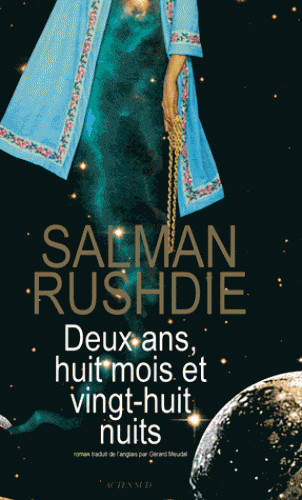Literature. Two Years, Eight Months and Twenty-Eight Nights. Salman Rushdie

THE WAR OF THE WORDS. Passengers on a train sweeping through the Belgian countryside overpower a man who emerges from the toilets carrying an automatic weapon and bent on destruction; quick thinking and courageous action avert carnage, disaster. But one summer evening, in a church in South Carolina, disaster is not averted: nine men and women die when a young man, also carrying an automatic weapon, opens fire. He says plainly what the man on the train most likely believed: he hoped that his actions would start a war.
What war? The war of the worlds, and it is this war that drives Salman Rushdie’s wonderful new novel, though on the face of it that war takes a very different shape. One of the noblest and oldest of the storyteller’s arts is to transmute the base stuff of life into the spun gold of the tale. “To recount a fantasy, a story of the imaginary,” Rushdie’s measured narrator states, “is also a way of recounting a tale about the actual.”
This fantastic and all-too-real tale begins with a love story that presages the war to come. As often in Rushdie’s work, his story finds a basis in fact – in this case the life of the rational Muslim philosopher Ibn Rushd, known as Averroes in the west, who lived and taught in Arab Spain at the end of the 12th century. (Spot the connection: Rushdie’s father changed his family’s name to honour Ibn Rushd.) One day, a beautiful orphaned girl who calls herself Dunia arrives at his door; being a rational man Ibn Rushd doesn’t guess that she is a jinnia, a great princess of those supernatural creatures who are made, we learn, of smokeless fire. The jinn are fascinated by humankind, and Dunia more than most. And so, a little less than 1,000 years later, the descendants of the philosopher and the jinn will find themselves called on to rise up in battle against those dark jinn who would destroy the earthly world.
It is a battle that will last two years, eight months and 28 nights – 1,001 nights, if you do the maths. Rushdie has long been enchanted by the tales Scheherazade told night after night to King Shahryar to keep herself from death; images from the Arabian Nights can be found woven into much of Rushdie’s fiction, and when asked on Desert Island Discs what book he’d take to console himself, the answer was the Arabian Nights. The resulting sequence of interwoven narratives throws the reader around like a rollercoaster – let’s say Coney Island’s Cyclone, since this novel is also an eccentric love letter to New York, home to the unlikely human heroes, a gardener called Geronimo and a would-be graphic novelist called Jimmy Kapoor, who will take on the dark jinn with a little help from the gorgeous Dunia, who returns to help the humans she so loves. The book has the hypnotic rhythm of the spoken story, and I found myself thinking that the simultaneously released audiobook is bound to be an especial treat.
The novel stays connected just enough to “real life” to raise the hairs on the back of your neck. A great storm strikes New York, and the rushing waters and darkened lights can’t help but recall Hurricane Sandy; a jinn-induced financial meltdown is all too believable. The gentle authorial voice knows how hard it will be for us to appreciate what’s really going on: human beings “had to learn to stop saying genie and associating the word with pantomime, or Barbara Eden in pink harem pants”.
Rushdie’s winks at the reader are both funny and pointed. The president of the United States is rendered helpless by the work of the jinn – this despite the fact that he is “an unusually intelligent man, eloquent, thoughtful, subtle, measured in word and deed, a good dancer (though not as good as his wife)… handsome (if a little jug-eared)…” And when the dark jinn Zumurrud the Great is looking for somewhere to set up his headquarters for the war, what better place than the “the faraway country of A”, which has repelled one foreign invasion after another, only to be taken over by “a murderous gang of ignoramuses who called themselves the Swots, as if the mere word would earn them the status of true scholars”.
And here is the link to the war of the worlds (so many wars, so many worlds) that daily fill the pages of the newspapers. Rushdie understands better than most that our power to envision a world beyond our own is our greatest blessing and perhaps our greatest curse. If there is a beautiful jinn to love us, there will be a dark jinn to destroy us too. But the dark delights that spring from his imagination in this novel have the spellbinding energy that has marked the greatest storytellers since the days of Scheherazade. “Stories told against death” are the stories which will carry us into the future; in their telling is both art and survival.
Two Years, Eight Months and Twenty-Eight Nights is published by Jonathan Cape (£18.99).











